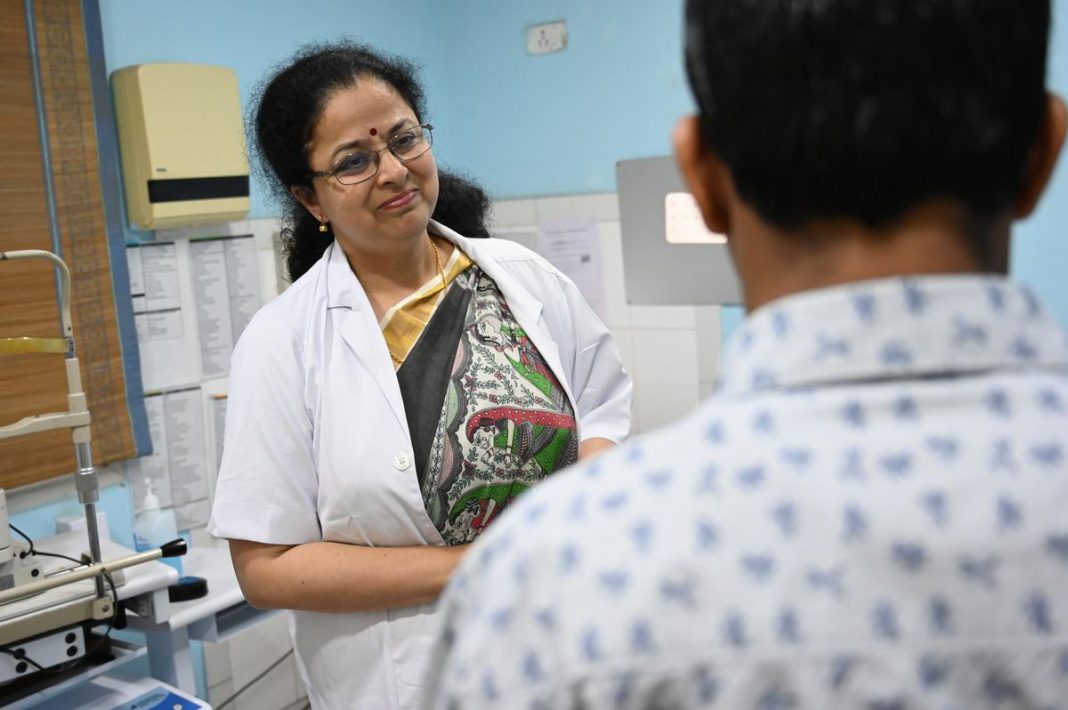
Dr. Suma Ganesh, Chairperson of the Pediatric Centre of Excellence and Head of Pediatric … [+]
Geoff Bugbee / Orbis International
Dr. Suma Ganesh, an Indian ophthalmologist at Dr Shroffs Charity Eye Hospital in New Delhi, India is not only helping to train the next generation of doctors working in children’s eye health, the program helps women to grow their careers without having to travel to another part of the world.
“My main project is the ‘sandwich fellowship’ through which I train pediatric ophthalmologists,” she said, “The fellowship started with the understanding that hospitals are crunched for resources and so cannot spare an ophthalmologist for prolonged periods of time while they undergo training at a distant location.
Ganesh, who is also Volunteer Faculty for Orbis International (an eye health NGO with 40 projects around the world) says that sandwich fellowship provides flexibility to the individual for completing the fellowship program and to the organization sending the candidate.
“Also, since there is an increase in women taking up ophthalmology, it can be difficult for them to leave their children at home for a long period while they undergo training,” she says, “Through this fellowship, it gives them a chance to grow and find a nice balance between their career and family life.”
Ganesh says she knew the model would work as she partly also went through a similar fellowship early in her career, when she completed a mix of e-learning, a US-based fellowship, mentors from the US coming to her in India to guide her in her surgeries via Orbis hospital-based training.
A focus on eye health in kids
Ganesh grew up in Mumbai and did her ophthalmology training at Lokmanya Tilak Municipal Medical College in Mumbai.
“I was always interested in the health of children as it should be a priority in any health programs wanting to make a difference,” she says, “I recognized the need to put emphasis on treating children’s eye problems when I was doing comprehensive ophthalmology training.”
Ganesh says she was fortunate to be the first Indian ophthalmologist to undergo an Orbis-sponsored fellowship in pediatric ophthalmology in 2001 at Manhattan Eye, Ear, and Throat Hospital under the guidance of Dr. Norman Medow.
“Early in my career, in the early 2000s, pediatric ophthalmology was not a subspeciality in north India and not much sought after as it was the era of phacoemulsification (a method of cataract surgery) growing as a subspecialty in India,” Ganesh says, “But pediatric ophthalmology is important because pediatric eyes are different from adult eyes, and they need to be screened and managed differently.
Ganesh says that when she started to do outreach to communities about eye health, it was very difficult.
“Myths regarding eye surgeries and children wearing glasses in India were so strong, and to break each obstacle was difficult,” Ganesh says.
She says, screening children and educating mothers on child eye care brought purpose to her life.
“We were illuminating light into the lives of so many homes and children and at the same breaking so many myths in the community,” she says, “The geographic area we were covering was so large, and the impact in the community was huge too.
Pandemic Ophthalmology
Ganesh says that providing training and healthcare during the pandemic has been a big challenge.
“Like so many eye care professionals around the world, early in the pandemic, my colleagues and I were only seeing emergency cases,” Ganesh says “Teleconsultations have helped us during the pandemic; it is a great boon that we can still be in touch with patients. Parents don’t feel lost as they can still communicate with the doctor over teleconsultations.
Ganesh says Ophthalmologists have done a lot to ensure patients can still get the eye care they need during the pandemic.
“This journey would not have been possible without a great team of co-consultants, optometrists, orthoptist, and my fellows,” she says, “I owe a lot to them.”

Ophthalmologists perform a operation on an Indian patient on board the ORBIS, an eye hospital on … [+]
AFP via Getty Images
Another doctor in the region helping to produce better health outcomes during the pandemic is Junaid Nabi.
A physician-turned-entrepreneur raised in Kashmir is now part of a team using big data and machine learning to help detect useful patterns in the tsunami of public health data generated world-wide by the COVID-19 crisis and do what he can for those back home.
Nabi, who is a public health researcher at Brigham and Women’s Hospital and Harvard Medical School in Boston, says his experiences with the health system in the developing world drives his current work.




